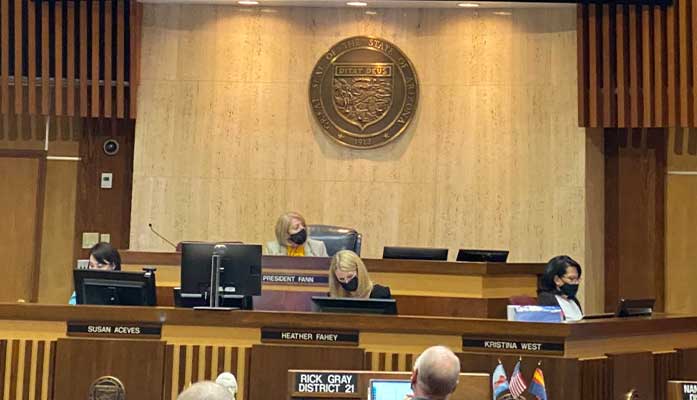
Gov. Hobbs’ Veto Streak Kills Bill With Strong Bipartisan Support
By Corinne Murdock |
Last week, Gov. Katie Hobbs’ veto streak killed a bill with strong bipartisan support. It was one of the 15 bills vetoed by the governor so far: SB1184, SB1248, SB1523, SB1524, SB1525, SB1526, SB1527, SB1528, SB1529, SB1530, SB1531, SB1532, SB1533, SB1534, and SB1535.
The bill that earned strong bipartisan support was SB1248, which originated from HB2529 by State Rep. T.J. Shope (R-LD08). SB1248 would’ve repealed the mandate for regulated health professions seeking an expanded scope of practice to undergo a statutory sunrise review. It passed 21-9 in the Senate, with five Democrats and all Republicans voting for it; in the House, it passed 42-18, with 12 Democrats joining all Republicans in voting for it. Hobbs vetoed the bill last week.
Talonya Adams, the woman twice vindicated in court for racial discrimination faced under Hobbs, said the legislature’s override of Hobbs’ veto “jeopardized her relevancy.”
“A principled [government] comprised of co-equal branches will eventually check a branch that exploits its power, with a [two-thirds] veto override,” said Adams.
So far, the legislature hasn’t overridden any of Hobbs’ vetoes.
In a letter explaining her decision to veto SB1248, Hobbs argued that fixing part of the problem with scope of practice expansion wasn’t sufficient for her since the government couldn’t ensure that these expansions would result in “equitable access to care.” She argued that the legislature needed to ensure equity in health care.
“Without the sunrise application process, provider groups could fast-track their priorities through the legislative process without adequate attention to why the change is necessary, or if it will impact communities with the greatest needs,” wrote Hobbs.
The same day that she vetoed the heavily-bipartisan legislation, Hobbs pledged to work with Democratic leadership to “find real solutions” to current state issues.
It wasn’t until last week that Hobbs allowed bills to pass unscathed by her veto stamp: SB1103 and SB1171. Hobbs said she signed these two bills because they were “good,” indicating that all other past legislation wasn’t.
SB1103 from Senate President Warren Petersen (R-LD14) allows the legislative body of a municipality or county to authorize administrative personnel to approve construction plans without public hearing. The intent of the legislation was to expedite home construction approvals in an effort to counter the ongoing housing shortage.
SB1103 passed 59-0 in the House and 25-3 in the Senate. Only Minority Leader Raquel Terán (D-LD26), Minority Caucus Chair Leah Alston (D-LD05), and State Sen. Anna Hernandez (D-LD24) voted against it.
SB1171 from State Sen. J.D. Mesnard (R-LD13) aligned Arizona tax law with changes made to the federal tax law by Congress. The legislation passed without any opposition in either the House or Senate.
Corinne Murdock is a reporter for AZ Free News. Follow her latest on Twitter, or email tips to corinne@azfreenews.com.

